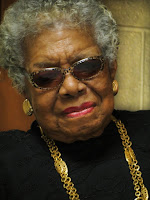Read and analyze "Graduation." Take notes; also annotate in the margins of the text and underline.
"Graduation" is a narrative essay, a bit different from the more formal persuasive speeches. An essay is a form of writing that deals with its subject from a personal point of view. Essays are always nonfiction (true), but that does not mean they don't often employ the elements we associate with fiction. As you read Angelou's "Graduation," I would like you to consider the following literary aspects and think about how Angelou effectively utilized these techniques. For each of the prompts below, try to locate specific sections of the text (page and paragraph numbers).
- What was Angelou's purpose in writing this essay? Remember author's often have more than one purpose.
- How does she effectively establish setting?
- What themes are evident in the text?
- How does Angelou use contrast effectively? (Consider the second paragraph, for example.)
- Cite her use of detail and imagery, and try to explain what mood Angelou is trying to create. What message or purpose or meaning does Angelou convey to the reader through her beautiful images (without directly stating those messages)? For example, in paragraph 6, Angelou includes a beautiful description of her mother making Angelou's dress. Though Angelou does not directly state it, what she is conveying to the reader is that she loves and admires her mother. The memory of the care and craft her mother displayed obviously left an impression on Angelou, who published this text in 1970, thirty years after the events she describes! Consider other passages with imagery and description. What does Angelou show us without telling us directly?
- Pay attention to all the color imagery in the text. How might this color imagery relate to a larger theme?
- Pay attention to the mood (emotional atmosphere) created by her descriptions of the events. What particular words and sentences establish those moods?
- Notice, also, Angelou's tone. Are there places where she is being slightly sarcastic, even humorous. Why is this effective for the reader?
- How does Angelou establish the personality/character of her young self? Find passages where she relates her thoughts. What do those thoughts tell you about this young girl?
- What sections of the text reveal a strong tone (author's attitude towards what she is writing about)? Describe that tone, and how does it help the reader understand Angelou's point of view and personality?
- Cite sections of the text that foreshadow what is to come.
- Where are the shifts/turns/transitions in the mood of the text most obvious? Explain.
- How is dialogue used effectively to show time and place, as well as characterization?Also cite instances of colloquial language/slang/particular word choice and phrases that establish and reveal the setting.
- How does Angelou establish the attitude and spirit of her community. Describe that community. What held them together? Give examples of the "community's personality" in the text. Would you have enjoyed living in this community? How are our communities today different?
- Where is the climax of the text?
- What happens that is unexpected? Cite details.
- How does Angelou sustain your interest at various points throughout the text? Cite details.
- The essay has a few major shifts in mood. What mood does the piece end with? Explain. Cite parts of the text that show that mood. Why are shifts in mood an effective technique?
- Try to outline how this essay is structured. Consider divisions in point of view, mood, setting, and theme.
- Explain how the very end of this essay becomes a narrative not just about the experience of Angelou, or of her hometown community, but rather an essay about something even larger. How does this transformative element in Angelou's writing add to the overall effect of her essay?
- Essays, if they are well written, have a universal appeal. All of us can relate to Angelou's experiences in some way. In what ways can you relate to her experience?
